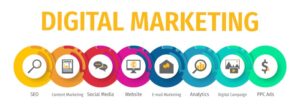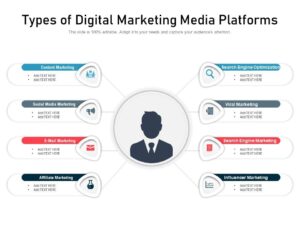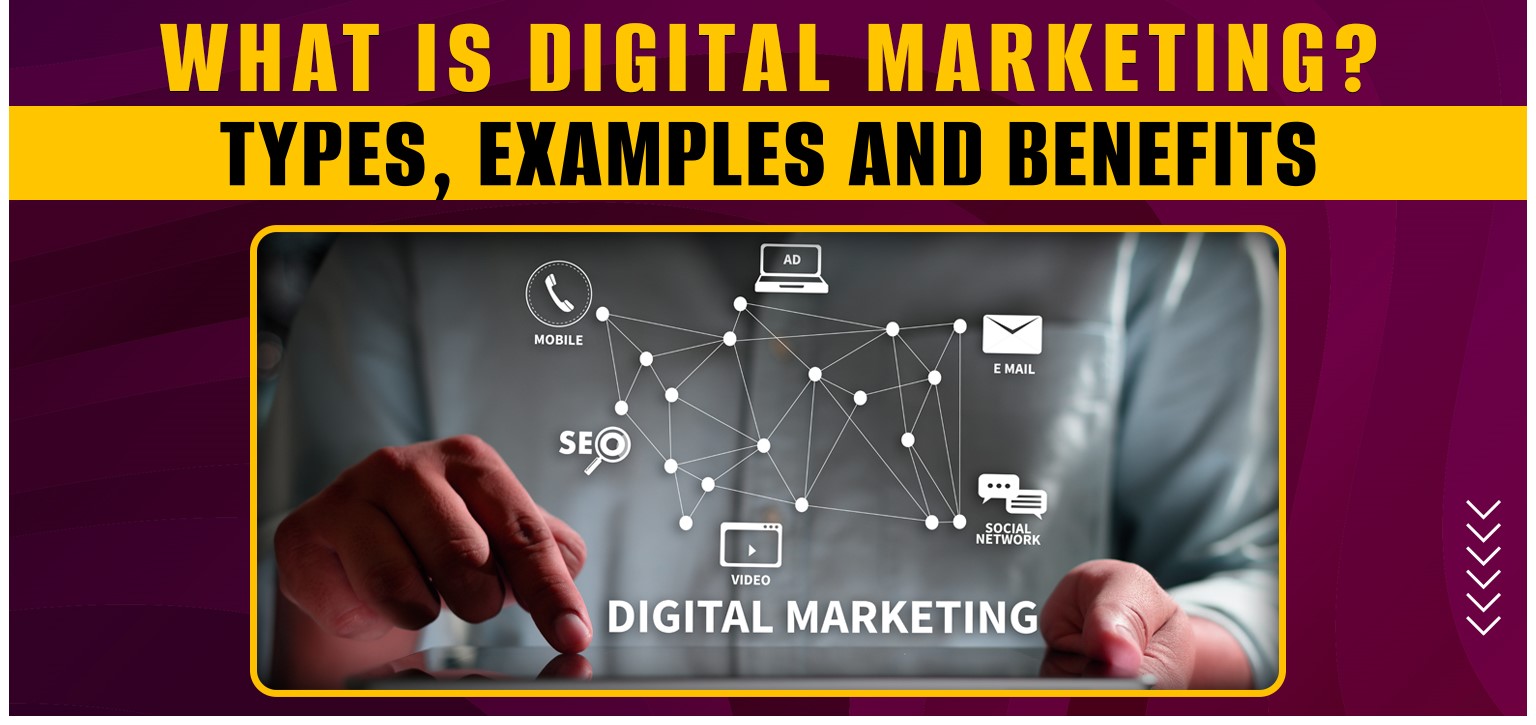Having a strong online presence is no longer a luxury, but a necessity for businesses of all sizes. With the vast majority of consumers turning to the internet to research, compare, and purchase products and services, a well-crafted digital marketing strategy can make all the difference between success and failure. However, for those who are new to the world of digital marketing, the sheer array of options, terminology, and techniques can be overwhelming. From social media and SEO to email marketing and beyond, the landscape of digital marketing can seem like a daunting puzzle to decipher. But fear not! This comprehensive guide delves into the world of digital marketing, explaining its core principles, exploring various types, and providing real-world examples to illuminate its power.
What is digital marketing?

Digital marketing encompasses all marketing efforts that leverage electronic devices or the internet. It’s about creating, delivering, and measuring marketing messages to targeted audiences through digital channels. The goal? To drive profitable customer engagement and ultimately, sales.
Key characteristics of digital marketing
The way businesses connect with customers has undergone a seismic shift. Traditional marketing methods, once the cornerstone of brand promotion, are no longer enough. Enter the dynamic world of digital marketing – a data-driven, interactive, and targeted approach that leverages the power of the internet to reach a vast audience. The key characteristics include:
- Measurable: Digital marketing campaigns can be tracked and analyzed in detail, allowing you to measure their effectiveness and optimize strategies.
- Interactive: Digital marketing fosters two-way communication between brands and customers, enabling real-time engagement and feedback.
- Targeted: You can tailor your marketing messages to reach specific demographics, interests, and online behaviors.
- Cost-effective: Digital marketing offers a wider reach and potentially lower costs compared to traditional advertising methods.
Benefits of digital marketing
In today’s digital age, consumers rely heavily on online channels to research products, discover brands, and make purchasing decisions. This presents a golden opportunity for businesses to leverage the power of digital marketing. But what exactly makes digital marketing so beneficial? Let’s look into the key advantages that set it apart from traditional marketing methods.
- Global reach: Digital marketing transcends geographical boundaries. Reach a worldwide audience with minimal investment compared to traditional international marketing efforts.
- Targeted audience: Laser focus your marketing efforts on your ideal customer base. Digital channels allow you to target specific demographics, interests, and online behavior.
- Measurable results: Unlike billboards or print ads, digital marketing campaigns can be meticulously tracked and analyzed. Gain valuable insights into performance metrics like website traffic, engagement, and conversions, allowing you to optimize your strategies for maximum impact.
- Cost-effective: Digital marketing offers a wider reach at potentially lower costs compared to traditional advertising methods. Utilize cost-effective strategies like SEO and content marketing to stretch your marketing budget further.
- Increased engagement: Digital marketing fosters two-way communication with your audience. Respond to comments, answer questions, and build relationships with potential and existing customers.
- Real-time insights: Gain valuable insights into customer behavior and preferences in real-time. This allows you to adapt your marketing messages and offerings based on current trends and audience response.
- Personalized marketing: Deliver personalized content and offers tailored to individual customer needs and interests. This enhances the customer experience and increases the likelihood of conversions.
- Improved brand reputation: By actively engaging with your audience and addressing their concerns, you can build a positive brand reputation and foster customer loyalty.
- 24/7 availability: Your website and online presence are accessible to potential customers 24/7, giving them the flexibility to learn about your brand and products at their convenience.
- Scalability: Digital marketing campaigns can be easily scaled up or down based on your budget and marketing goals. Start small and gradually increase your efforts as you measure success.
Examples of digital marketing in Action
Imagine you run a bakery specializing in delicious handcrafted cakes. Here’s how digital marketing could come to life for your business:
- Search Engine Optimization (SEO): Optimizing your bakery’s website to rank higher in search results for keywords like “custom cakes near me.”
- Content marketing: Sharing mouthwatering cake photos and recipes on your blog and social media platforms.
- Social media marketing: Engaging with potential customers on platforms like Instagram and Facebook, showcasing your cakes and running targeted ads.
- Email marketing: Building an email list and sending personalized promotions to subscribers, highlighting new cake flavors and special offers.
The different types of digital marketing

Offering a diverse set of tools and strategies to connect with your target audience. Consider it a toolbox, brimming with options to tailor your approach and maximize your reach. Here, we delve into some of the most common and effective types of digital marketing you can leverage to achieve your marketing goals:
- Search Engine Marketing (SEM): This includes both SEO (discussed above) and Pay-Per-Click (PPC) advertising, where you pay to display your ads on search engine results pages.
- Content marketing: Creating and sharing valuable, informative content (like blog posts, infographics, or videos) to attract and engage your target audience.
- Social media marketing: Utilizing social media platforms to connect with your audience, build brand awareness, and promote your offerings.
- Email marketing: Building an email list and sending targeted email campaigns to nurture leads and drive sales.
- Affiliate marketing: Partnering with other websites or influencers to promote your products or services and earn a commission on sales generated through their referrals.
- Mobile marketing: Reaching customers through their smartphones and tablets using SMS marketing, mobile apps, and targeted ads.
Understanding your audience
Effective digital marketing isn’t a one-size-fits-all approach. Imagine shouting your message into a crowded room – it’s unlikely to resonate with everyone. The key to success lies in understanding your target audience – those most likely to be interested in your products or services. Here’s a deeper dive into why audience understanding is crucial and how to gain valuable insights:
Why audience understanding matters:
- Targeted messaging: By understanding your audience’s demographics, interests, and pain points, you can craft messaging that speaks directly to their needs and desires. This personalized approach leads to higher engagement and conversions.
- Channel selection: Different platforms cater to different demographics and interests. Knowing where your audience spends their time online allows you to choose the most effective channels for reaching them.
- Content creation: Creating valuable content that resonates with your audience is essential. Understanding their interests and challenges allows you to develop content that addresses their needs and provides solutions.
- Building relationships: Effective marketing goes beyond just selling. By understanding your audience, you can build genuine relationships with them, fostering trust and loyalty in the long run.
How to gain valuable audience insights:
- Market research: Conduct market research to gather data on your target audience’s demographics, interests, and online behavior. Utilize tools like surveys, polls, and focus groups.
- Social media listening: Pay attention to online conversations happening on social media platforms relevant to your industry. Social listening tools can help you identify trends, brand sentiment, and audience interests.
- Website analytics: Leverage website analytics tools to understand your audience’s online behavior on your website. Analyze demographics, traffic sources, and pages visited to gain valuable insights.
- Customer reviews and feedback: Pay close attention to customer reviews and feedback. This can reveal valuable insights into their pain points, preferences, and overall experience with your brand.
- Competitor analysis: Research your competitors and their target audience. Analyze their marketing strategies and the types of content they create to gain insights into your audience’s broader interests.
Building buyer personas:
Combining your audience research with creative storytelling, can develop buyer personas – fictionalized representations of your ideal customers. These personas should encompass demographics, interests, online behavior, and pain points. Visualize your target audience in this way and tailor your messaging and marketing efforts to resonate with them on a deeper level. Remember, audience understanding is an ongoing process. As you gather more data and interact with your customers, your understanding will evolve. Continuously refine your buyer personas and adapt your strategies to ensure your digital marketing efforts reach the right people at the right time.
Frequently Asked Questions (FAQ) about digital marketing
Here’s an expanded FAQ section on digital marketing to complement your blog post:
General questions:
- Do I need a digital marketing strategy?
Absolutely! A well-defined strategy acts as your roadmap, outlining your goals, target audience, channels, and tactics. It ensures your digital marketing efforts are cohesive and aligned with your overall business objectives.
- Do I need a big budget for digital marketing?
Not necessarily! Digital marketing offers various cost-effective strategies, making it accessible for businesses of all sizes.
- Can I do digital marketing myself?
Yes, with some effort and learning. However, many businesses choose to partner with digital marketing agencies for specialized expertise.
- How often should I update my digital marketing strategy?
The digital landscape is constantly evolving. Regularly monitor trends, analyze your results, and be prepared to adapt your strategy for optimal performance.
- What are the benefits of digital marketing?
Digital marketing offers numerous benefits, including:
a) Wider reach and targeted audience engagement.
b) Measurable results and data-driven optimization.
c) Cost-effective strategies compared to traditional marketing.
d) Increased brand awareness and customer loyalty.
e) Improved lead generation and conversion rates.
f) Real-time interaction and feedback with customers.
- How can I stay up-to-date on the latest digital marketing trends?
The digital marketing landscape is constantly evolving. Here are some ways to stay informed:
a) Subscribe to industry blogs and publications.
b) Follow digital marketing experts and influencers on social media.
c) Attend industry conferences and webinars.
d) Utilize online courses and certifications to expand your knowledge.
Specific questions by channel:
- SEO: How long does it take to see results from SEO efforts?
SEO is a long-term strategy. Results can take several months to become noticeable, depending on the competitiveness of your target keywords and the overall health of your website.
- Content Marketing: What types of content are most effective in digital marketing?
The best content type depends on your target audience and goals. However, some high-performing options include blog posts, infographics, videos, case studies, and ebooks.
- Social Media Marketing: Which social media platforms should I focus on?
Focus on the platforms where your target audience spends their time. Conduct research to understand your audience demographics and their preferred social media channels.
- Email Marketing: How can I build a strong email list?
Offer valuable incentives like discounts or free resources in exchange for email signups. Ensure your website and social media channels have clear opt-in forms.
- Mobile Marketing: How can I leverage mobile marketing for my business?
Develop a mobile-friendly website, create a mobile app (if relevant), and utilize SMS marketing or targeted mobile ads to reach your audience on their smartphones.
Measurement and ROI:
- How can I measure the return on investment (ROI) of my digital marketing campaigns?
Most digital marketing platforms offer analytics tools that track key metrics like website traffic, lead generation, conversion rates, and social media engagement. Analyze these metrics to gauge the effectiveness of your campaigns and calculate your ROI.
- What are some common digital marketing metrics to track?
Here are some key metrics to consider:
* Website traffic and user behavior
* Conversion rates (e.g., leads generated, sales)
* Social media engagement (likes, shares, comments)
* Email marketing open rates and click-through rates
* Cost-per-acquisition (CPA)
Conclusion
Digital marketing offers a powerful toolbox for businesses of all sizes to connect with customers, build brand awareness, and drive sales. Whether you’re a seasoned entrepreneur or just starting out, understanding the core principles, exploring different types, and implementing the right strategies for your target audience can unlock a world of digital marketing success. Remember, the key lies in continuous learning, adaptation, and a commitment to building meaningful connections with your customers in the ever-evolving online world.
